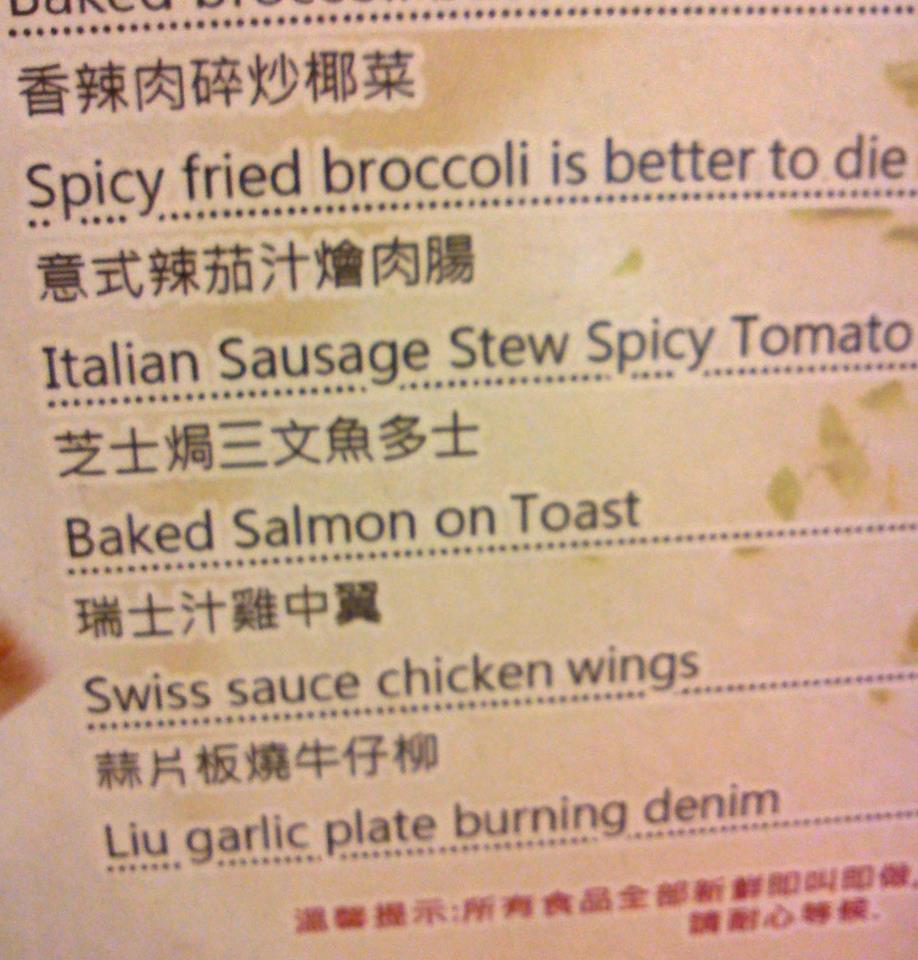Tape bacteria, risotto cowboy, burning denim, and better to die
« previous post | next post »
Martyn Cornell sent in these entries of a menu from a cheap-and-cheerful “Italian” restaurant in North Point, Hong Kong run by local Chinese:
They may be annotated and explicated as follows:
(1)
香辣肉碎炒椰菜
Spicy fried broccoli is better to die
Literally,
香辣: spicy
肉碎: minced pork
炒: sautéed
椰菜: cabbage
In Jyutping,
| 香 | 辣 | 肉 | 碎 | 炒 | 椰 | 菜 |
| hoeng1 | laat6 | juk6 | seoi3 | caau2 | je4 | coi3 |
Notes: The phrase "is better to die" perhaps comes from the common English translation of the Chinese proverb "Níng wéi yùsuì, bùzuò wǎquán" 寧為玉碎,不作瓦全 ("It's better to die when life is a disgrace", lit., "[I'd] rather be a shattered / fragmentary jade than an intact / complete tile"). Because 玉 and 肉 are homonyms, perhaps someone phonetically entered 玉碎 instead of 肉 碎 into the translation software and received this truncated output?
(2)
蒜片板燒牛仔柳
Liu garlic plate burning denim
Literally,
蒜片: garlic slices
板燒: teriyaki
牛仔柳: veal loin
In Jyutping,
| 蒜 | 片 | 板 | 燒 | 牛 | 仔 | 柳 |
| syun3 | pin2 | baan2 | siu1 | ngau4 | zai2 | lau5 (Mandarin liǔ) |
Notes: 板燒 literally means "board burn / grill". 牛柳 is tenderloin, but apparently the translation software didn't know this, so the character 柳 was left transcribed. A pair of denim jeans are called 牛仔褲 (lit., "cowboy pants") in Hong Kong, since as far back as the 1970s jeans have always been associated with cowboys, at least in TV commercials. Perhaps because of this 牛仔柳 was thought to be made from denim as well!
(3)
鮮﹙露 笋﹚雜菌帶子意大利飯
Fresh Asparagus Risotto tape bacteria
Literally,
鮮: fresh
露笋: asparagus
雜菌: mixed mushrooms
帶子: scallop
意大利飯: risotto (lit., "Italian rice")
In Jyutping,
| 鮮 | 露 | 笋 | 雜 | 菌 | 帶 | 子 | 意 | 大 | 利 | 飯 |
| sin1 | lou6 | seon2 | zaap6 | kwan2 | daai3 | zi2 | ji3 | daai6 | lei6 | faan6 |
Notes: jūn 菌 means "fungus, mushroom, mold"; "bacterium" is translated into Chinese as xìjūn 細菌 (lit., "fine fungus").
The confusion between bacteria and mushroom was earlier explained on Language Log here.
帶子 in this context means "scallop", but it can also mean anything from "carrying a child" to "belt" or "tape" — the latter as in 卡式帶 ("cassette tape").
(4)
蒜片燒汁牛仔柳意大利
Garlic Sauce Risotto cowboy Liu
Literally,
蒜片: garlic slices
燒汁: teriyaki sauce
牛仔柳: veal loin
意大利飯: risotto
In Jyutping,
| 蒜 | 片 | 燒 | 汁 | 牛 | 仔 | 柳 | 意 | 大 | 利 | 飯 |
| syun3 | pin2 | siu1 | zap1 | ngau4 | zai2 | lau5 | ji3 | daai6 | lei6 | faan6 |
Notes: Similar to item (2), but here 牛仔, which means "veal", is mistranslated as "cowboy" instead of "denim".
Comment from a Hong Kong native: "Hilarious! This kind of messed up translation has been occurring at an alarming rate in HK in recent years. I wonder if they have 'out-sourced' the translation job to the mainland…."
[Thanks to Abraham Chan, Mandy Chan, Sai Law, and Bob Bauer]


Sili said,
August 21, 2012 @ 11:52 am
The first one sounds more delicious before correction.
Tim S. said,
August 21, 2012 @ 1:10 pm
Spicy fried broccoli is better to die
Reading that I assumed it was an attempt at " the broccoli is to die for"
David Moser said,
August 21, 2012 @ 1:35 pm
Interesting that the computer has opened glorious new vistas of Chinglish that would have been impossible if generated by mere humanly flawed translation. And it strikes me that these computer-generated gems have an endearing charm of their own. Some of these make my head swirl as much as any Rimbaud poem.
ALEX MCCRAE said,
August 21, 2012 @ 2:03 pm
Just a thought.
Perhaps the phrase "is better to die", referencing the menu item "Spicy fried broccoli", is actually a clumsily wrought translation of the fairly common English exclamatory phrase, "it's to die for."; often referring to a particularly scrumptious food item.
Hmm…. I think I'll pass on that "Liu garlic plate burning denim", in lieu of (pun intended)' Liu's garlic plate seersucker. Yum!
I must confess I suffer from a rare eating disorder, namely 'cottonphagia', a compulsive need to ingest cotton fabric. Although the added sautéed garlic does seem to render the cotton half palatable.
Not a highly recommended regimen for getting one's daily fiber needs met, however. Stick to raisin bran, or root veggies.
Ben Bolker said,
August 22, 2012 @ 12:14 pm
The jade/tile proverb reminds me of (a reversed version of) "It is better to be a live jackal than a dead lion" — although the sentiment is immediately disavowed in the original full quotation (http://en.wikiquote.org/wiki/Sidney_Hook)
rehana said,
August 26, 2012 @ 12:10 am
Interesting that the confused parts aren't capitalized, and everything else is except for garlic and sauce
ExOttoyuhr said,
September 10, 2012 @ 6:37 pm
I want to know why the machine translator inserted extraneous pants, and how it decided that certain characters weren't worth bothering with.
And it's entirely too good at translating "risotto." If there are any cases where the "Italian" part and the "cooked rice" part can legitimately stand independent of each other, I'm sure it misses them…